|
|
|
Sort Order |
|
|
|
Items / Page
|
|
|
|
|
|
|
| Srl | Item |
| 1 |
ID:
131417
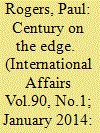

|
|
|
|
|
| Publication |
2014.
|
| Summary/Abstract |
The article argues that the century from 1945 is likely to prove seminal in terms of human progress. It marks the period when the human community has to come to terms with its capacity for self-destruction through the invention of weapons of mass destruction and its ability to exceed the homeostatic capabilities of the global ecosystem in an era of deep socio-economic divisions. Two-thirds of the way through this century the progress has been mixed. Nuclear war has been avoided more by luck than by wisdom, there remain risks of nuclear proliferation and it is not evident that humankind has acquired the ability to deal with the destructive potential of bio-, nano- and other emerging technologies. Recognition of the extent of anthropogenic impacts on ecosystem stability is evident, but not at the level necessary for the radical responses required. Even so, there are signs of progress and potential for change, suggesting that the final one-third of the century will be singularly important in ensuring long-term emancipation and environmental sustainability.
|
|
|
|
|
|
|
|
|
|
|
|
|
|
|
|
| 2 |
ID:
185235
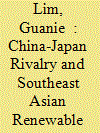

|
|
|
|
|
| Summary/Abstract |
In recent years, China and Japan have increasingly competed against each other over infrastructure provision in Southeast Asia, their near abroad. Through an analysis of energy infrastructure provision in Indonesia, this article argues that Indonesia has benefited from Chinese and Japanese financial resources in providing energy to otherwise remote and isolated communities. However, Indonesia’s domestic interest groups and its political economic structure have promoted nonrenewable energy adoption at the expense of renewable sources. Indeed, Indonesia’s demand for nonrenewable energy has opened up opportunities for both Chinese and Japanese firms. While Chinese firms have definitively grown their market share in nonrenewable energy infrastructure, especially coal-fired power plants, so too have their Japanese counterparts. The emphasis on coal-fired power has not only hindered renewable energy expansion, but also led to ecological damage. Furthermore, several Indonesian private firms with long-standing interests in coal mining and processing have forged collaborative ties with the Chinese and Japanese firms to enter the business of operating coal-fired power plants, while securing a captive market for their coal supplies. These findings illustrate that China-Japan competition is more complex than commonly portrayed, in addition to raising questions about Chinese and Japanese claims of a “green” Belt and Road Initiative and Partnership for Quality Infrastructure, respectively.
|
|
|
|
|
|
|
|
|
|
|
|
|
|
|
|
| 3 |
ID:
134211
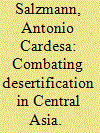

|
|
|
|
|
| Publication |
2014.
|
| Summary/Abstract |
This article appraises the Central Asian Countries' Initiative on Land Management (CACILM) as an innovative experience of regional co-operation to implement the Convention on Desertification. Despite high initial expectations, the actual implementation process has suffered drawbacks. The Central Asian countries' commitment and capacity to sustain this process depends heavily on international support. Moreover, the process's low political profile and the weak capacities of the Central Asian authorities to engage in meaningful transnational co-operation are significant hurdles to be tackled. At the same time, national and regional efforts to combat soil degradation and desertification have not yet been properly mainstreamed with other more consolidated processes for the sustainable management of natural resources, such as the IFAS. It is argued that this may be a possible solution for the future of CACILM.
|
|
|
|
|
|
|
|
|
|
|
|
|
|
|
|
| 4 |
ID:
182789


|
|
|
|
|
| Summary/Abstract |
We test how crop insurance participation affects the intensity of pesticide use in China using data on staple crop production from eight provinces. Our preferred specification instruments farmers' decisions of participation in insurance by village-level intensities of promotional activities and controls for province fixed effects. We find crop insurance participation significantly reduces pesticide use intensity. The reduction effect is greater for smaller plots, older farmers, and farmers who are more risk averse.
|
|
|
|
|
|
|
|
|
|
|
|
|
|
|
|
| 5 |
ID:
175003
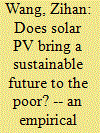

|
|
|
|
|
| Summary/Abstract |
Improving the socioeconomic status of poor households has always been considered as an effective method to the help poor out of environmental inequality, but there is little literature to prove whether poverty alleviation measures can also have environmental deprivation for the poor. In this study, we explored whether the Chinese government's efforts for the poor to escape poverty can achieve environmental sustainability, and whether photovoltaic poverty alleviation projects (PPAP) can alleviate regional poverty while avoiding environmental deprivation. In order to find if the government's attempts to protect the environment and reduce poverty are effective, we evaluated in this article the impact factors of China's anti-poverty policy on the environmental sustainability in rural poor areas from the perspectives of poor households' environmental awareness and surrounding eco-environment. The methods used in this article are Entropy Weight Method (EWM) and Stochastic Frontier Analysis (SFA). The results show that only anti-poverty policies related to education and sustainable agriculture have positive impacts on rural environmental sustainability. The direct effect of photovoltaic poverty alleviation policy on environmental sustainability in the poverty-stricken areas from a micro perspective is not optimistic. Poverty alleviation projects related to renewable energy should consider increasing the participation of poor households. Based on the conclusions of this study, we have proposed corresponding policy recommendations.
|
|
|
|
|
|
|
|
|
|
|
|
|
|
|
|
| 6 |
ID:
158756
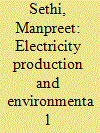

|
|
|
| 7 |
ID:
138400
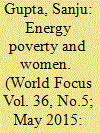

|
|
|
|
|
| Summary/Abstract |
Access to clean, affordable, sustainable energy is thus an enabling factor for economic development and poverty reduction as well as for achievement of internationally agreed development goals, including ensuring environmental sustainability and promoting gender equality. At the same time, access to energy services can be argued to be a human right in itself.
|
|
|
|
|
|
|
|
|
|
|
|
|
|
|
|
| 8 |
ID:
136240


|
|
|
|
|
| Summary/Abstract |
Community views toward the risks and benefits of emerging renewable energy technologies are important factors in facility siting decisions and their eventual success. While the actual socioeconomic and biophysical impacts of proposed industrial developments are fraught with uncertainty, understanding public perceptions is critical in managing costs and benefits to local citizens. Here, we explore the social acceptability of forest-based biorefineries in Maine using random utility modeling to identify how project attributes and citizen characteristics interact to affect level of support. Using a statewide sample (Statewide) and a subsample of mill towns (Mill Towns), we found that: (1) in both samples, individual characteristics had similar coefficients and significance levels except for pro-environment attitudes; (2) the coefficients related to the industry’s negative attributes were notably different between the two samples, while positive attributes were not; (3) in both samples, positive industry attributes such as “producing products from a sustainable resource” and “increased economic development” were the most influential variables in determining the level of support for a new biorefinery in an individual’s community; and (4) in general, Mill Town respondents were more accepting of potential negative attributes such as increased levels of truck traffic, odor, noise, and air and water pollution.
|
|
|
|
|
|
|
|
|
|
|
|
|
|
|
|
| 9 |
ID:
133448
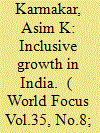

|
|
|
|
|
| Publication |
2014.
|
| Summary/Abstract |
The Twelfth Plan must be guided by a vision of India moving forward in a way with emphasis on inclusion and sustainability while minimising downside effects on growth that would ensure a broad-based improvement in living standards of all sections of the people through a growth process which is faster than in the past, more inclusive and also more environmentally sustainable. So the immediate task before the economy is to make growth more inclusive where inclusiveness implies the fast removal of poverty, generation of employment and equitable distribution of benefits of growth and human capability development.
|
|
|
|
|
|
|
|
|
|
|
|
|
|
|
|
| 10 |
ID:
128521


|
|
|
|
|
| Publication |
2013.
|
| Summary/Abstract |
Asia is the most populous and rapidly urbanizing region in the world today and features 23 of the world's 40 biggest metropolitan areas. In many Asian countries, accelerated economic development, industrialization and urbanization have been accompanied by a growing acceptance that decentralization (the devolution of central state powers, responsibilities and resources to the sub-national scale)4 can lead to more effective and responsive governance in state, provincial, city and regency jurisdictions. This trend toward decentralized governance in Asia has often, but not always, been precipitated by a transition away from authoritarian regimes to more democratic forms of governance. Discourses about the desirability of democratic decentralization have typically emphasized the devolution of central state authority as the preferred means by which to empower communities and to increase the voice and participation of ordinary citizens in governmental decision-making processes that affect their lives and livelihoods. Thus, decentralization policies in urbanizing Asia have aimed to encourage the active involvement of urban residents in addressing shared dilemmas concerning issues such as environmental sustainability, public service delivery, community building and socio-political stability in often densely concentrated and ethnically diverse populations. At the same time, however, decentralization within the contexts of globalization and privatization may circumvent critical aspects of democratic procedure if sub-national government officials use their increased access to state power and resources to nurture clientelistic networks of patronage and/or to tap into wider circles of regional or global economic activity at the expense of local urban development.
|
|
|
|
|
|
|
|
|
|
|
|
|
|
|
|
| 11 |
ID:
173633
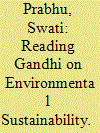

|
|
|
|
|
| Summary/Abstract |
There are numerous interpretations of Gandhi’s thoughts in association with environmental sustainability. However, there is a need for a clearer conception of his ideas such as non-violence and Sarvodaya in order to further elucidate its relevance in the present-day sustainability discourse. Gandhi’s ideas on development suggested a bottom-up approach to comprehend the realities of rural development. For him, development planning implied focussing on the poorest of the poor i.e., the concept of Antyodaya.
|
|
|
|
|
|
|
|
|
|
|
|
|
|
|
|
| 12 |
ID:
121039


|
|
|
|
|
| Publication |
2013.
|
| Summary/Abstract |
This essay notes some of the key institutions created in the twentieth century for the purpose of delivering energy in North America. Those institutions are being challenged by a combination of stresses in three interconnected areas: reliability, economics, and environmental sustainability. The essay argues that these three stresses create an "energy trilemma" requiring institutional reform. We suggest that new and modified institutions can best be understood if we evaluate them along three dimensions: institutional scale, structure, and scope. We consider real-world examples of recent institutions in light of each of these dimensions and note both successes and concerns that those factors illuminate. We conclude by noting that some institutional changes will be organic and unplanned; but many others, including responses to climate change, will benefit from conscious attention to scale, structure, and scope by those engaged in designing and building the energy institutions needed in the twenty-first century.
|
|
|
|
|
|
|
|
|
|
|
|
|
|
|
|
| 13 |
ID:
130303
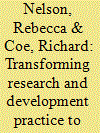

|
|
|
|
|
| Publication |
2014.
|
| Summary/Abstract |
Millions of smallholder farmers face the daunting challenge of sustaining or improving productivity in the face of rising input costs, limited access to input and output markets, climate vagaries, and depleted natural resources. These farmers' objectives and circumstance are diverse, varying with both their biophysical environments and their socioeconomic and cultural context. Agroecological intensification (AEI), or the integration of agroecological principles into farm and system management can improve the performance of agriculture-"performance" being locally defined and potentially including productivity, nutrition, resilience, and sustainability.
|
|
|
|
|
|
|
|
|
|
|
|
|
|
|
|
| 14 |
ID:
131830
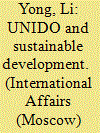

|
|
|
|
|
| Publication |
2014.
|
| Summary/Abstract |
THE RUSSIAN FEDERATION represents one of my first travel destinations since my recent appointment as Director General of UNIDO, and this is a strong reflection of my appreciation of, and confidence in our existing and future joint cooperation activities.
Today, when many countries of the world face similar challenges in balancing economic growth, environmental sustainability and social and economic inclusion, UNIDO's mandate is relevant more than ever.
|
|
|
|
|
|
|
|
|
|
|
|
|
|
|
|
|
|
|
|
|